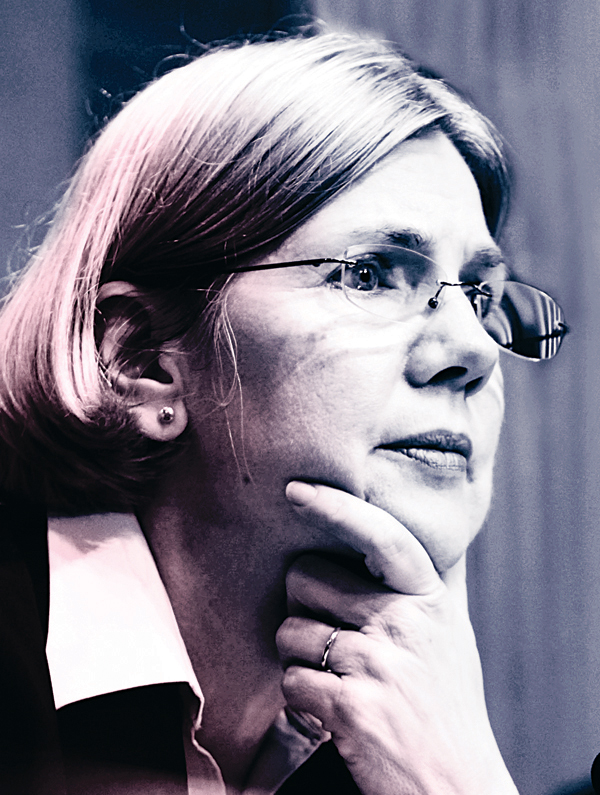Elizabeth Warren: Stumped

Photo by Gerald Herbert/AP Images
On a sunny afternoon in May, a scrum of reporters has gathered outside the industrial-chic Brookline pizzeria Jimmy’s Bar & Oven. “It looks like a ladies’ garden party in here,” someone says, observing the group of white, middle-aged women in khaki capri pants and glasses who are scuttling about on the patio handing out Elizabeth Warren signs to people walking by.
Warren, the Harvard law professor and sharp-tongued consumer advocate who’s running for Senate, is scheduled to make a campaign stop here any minute. The turnout is pretty good, but it’s been a rough few weeks for the candidate, a stretch that began when the Herald reported that the law schools at both the University of Pennsylvania and Harvard have at one time or another listed her in their registries as a Native American. A controversy has been raging ever since, centered primarily on whether Warren falsely identified herself that way in order to get an unfair advantage in the hiring process.
At first, Warren responded to the criticism by insisting that she’s always believed she is, indeed, part Cherokee. Asked for evidence of her heritage, she even replied that her grandfather had high cheekbones. After that, Warren essentially stopped talking about the issue, or anything else. It’s now been 12 silent days since her last press event.
Her inability to come up with a credible explanation for the university records has allowed to fester the impression that she perhaps did bend the rules. The clumsy response has served to underscore the fact that she’s an inexperienced candidate running in her first-ever race. It has also distracted attention from the qualities that drew her supporters to her in the first place: her decisiveness, good judgment, and grace under fire.
When Warren pulls up in a black SUV and jumps out to greet the crowd, her skin is flushed to match her salmon-colored jacket. She spots Louie Goldsmith, a floppy-haired middle schooler wearing an oversize “Elizabeth Warren 2012” T-shirt, and reaches out to shake his hand. “It’s good to see you,” she says. “I hear you’re the top of the heap here.”
“I’m not sure if I’m the top of the heap,” he replies, “but I’m volunteering.”
“Well, I can use the help,” Warren says.
As if on cue, about 15 members of the media, including several TV crews, swarm around her. Fortunately for Warren, she has good things to talk about: A poll released the night before found that she and her opponent, the incumbent Senator Scott Brown, are in a dead heat, and that 69 percent of voters believe the ancestry controversy to be a non-issue. But the reporters ask anyway. Over the next seven minutes, she’s bombarded with questions:
“Are you a minority?”
“Will you come clean to the Cherokee nation?”
“Why did you claim to be a Native American, then stop?”
“Will you just provide us with the documentation and put it to rest?”
Warren tells them she won’t back away from her family history and then says she’s done answering these questions.
A few minutes later, she regroups and climbs onto a chair to speak to supporters. She launches into a story, telling the room about how she conceived of an entire federal agency—the Consumer Financial Protection Bureau (CFPB)—then forced it into existence. “The first thing people told me is that it was a great idea, and would make a real difference,” she says. “The second thing they said to me is ‘Don’t do it.’ They said, ‘Don’t do it because you can’t possibly win. The lobbyists will assemble an army, and they will block the CFPB.’” Warren starts making jabbing motions with her hand. “I heard this as try harder! I’ve read too many Nancy Drew novels. I’m the intrepid girl policymaker.” She promises to build coalitions in the Senate in order to get things done. “How do you do it?” she cries as the crowd applauds wildly. “The answer is to play the outside game.”